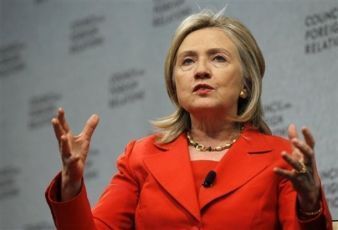US says South Sudan independence ‘inevitable’, warns of “ticking time bomb”
September 8, 2010 (KHARTOUM) – The United States Secretary of State Hillary Clinton on Wednesday said that her country is working hard with international partners to defuse “a ticking time bomb” in Sudan ahead of a vote in January 2011 on what she termed the “inevitable” independence of south Sudan.

The signatories of the agreement, the National Congress Party (NCP) in the north and the Sudan People’s Liberation Movement (SPLM) in the south, are currently engaged in talks with little progress over post-referendum issues, including oil wealth, borders, citizenship as well as foreign debts.
However, preparations for the plebiscite itself are seriously behind schedule due to bickering between the two parties over appointment of the commission tasked to organize the exercise.
Clinton’s remarks come in the run-up to a US-organized meeting due to be held on the margins of the UN’s general assembly session on 24 September to garner international support for the referendum and discuss the situation in Sudan’s troubled western region of Darfur. The US invited delegations of the NCP and the SPLM to attend the meeting.
The meeting’s profile has been raised by US confirmation that US president Barack Obama will attend the meeting.
“The situation north/south is a ticking time-bomb of enormous consequence,” Clinton told audience after a speech on U.S. foreign policy at the Council on Foreign Relations.
She further said that the time remaining for referendum date, which is in January 2011, is “very short” and later added that “the real problem is what happens when the inevitable happens and the referendum is passed and the south declares independence.”
Clinton declared that the US had put “all hands on deck” to assist referendum preparations, adding that her country had recently sent the former senior U.S. diplomat Princeton Lyman to help the SPLM and the NCP to iron out post-referendum issues.
But she said that despite international efforts, north and south Sudan will have to make concessions on secession arrangements in order to avoid setback to violence.
“Even if we did everything perfectly … the reality is that this is going to be a very hard decision for the north to accept,” Clinton said.
“So we’ve got to figure out some ways to make it worth their while to peacefully accept an independent south and for the south to recognize that unless they want more years of warfare and no chance to build their own new state they’ve got to make some accommodations with the north as well” she added.
“What happens to the oil revenues?” she said. “And if you’re in the north and all of a sudden you think a line’s going to be drawn and you’re going to lose 80 percent of the oil revenues, you’re not a very enthusiastic participant. What are the deals that can possibly be made that will limit the potential of violence?”
“Even if we did everything perfectly and everyone else — the Norwegians, the Brits, everybody who is weighing in on this — did all that they could, the reality is that this is going to be a very hard decision for the north to accept,” she said.
Clinton acknowledged that the chief US focus has shifted from Darfur region to ensuring a smooth secession for the south. However, she said that the situation in Darfur was “dangerous, difficult, not stable.”
The conflict in Sudan’s westernmost region of Darfur region broke out in 2003, just as south Sudan war was heading to its end. A harsh counterinsurgency campaign mounted by the central government against rebels belonging mostly to African tribe has triggered one of the worst humanitarian crises in recent history. The UN estimates that the conflict has killed 300.000 people and displaced more than 2 millions.
OBAMA TO ATTEND SUDAN MEETING
In New York, US Ambassador to the UN Susan Rice on Wednesday told reporters that “President Obama has accepted the (U.N.) Secretary-General’s invitation to the high-level meeting on Sudan.”
Rice said that Obama “sees this meeting on the 24th as a very important vehicle for focusing international attention on … (the referendum) as Sudan approaches really the last critical 100 days before that vote takes place.”
Meanwhile in Khartoum, Sudan’s official news agency, SUNA, reported yesterday that Clinton had made a phone call to Vice-President Ali Osman Muhammad Taha and expressed “gratitude” for the efforts exerted by the Sudanese authorities in securing the safe release an American aid worker who was kidnapped in Darfur region.
According to SUNA, Clinton also expressed “relief over the progress made on the referendum issues” and her country’s support for “ongoing efforts to realize peace and stability in Darfur.”
In response, SUNA said that Taha had reiterated the government’s commitment to hold the referendum and achieve peace in Darfur.
The U.S. state department spokesman P.J. Crowley said that Clinton also called South Sudan president Salva Kiir “encourage them to continue everything they can do in the coming weeks and months to promote full implementation of the 2005 Comprehensive Peace Agreement and make preparations for the referendum in early January,”
(ST)
